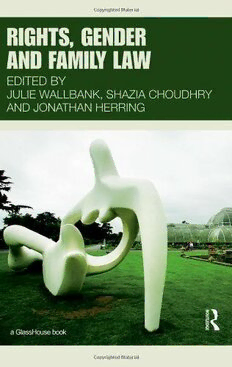
Rights, Gender and Family Law PDF
301 Pages·2010·2.658 MB·English
Most books are stored in the elastic cloud where traffic is expensive. For this reason, we have a limit on daily download.
Preview Rights, Gender and Family Law
Description:
There has been a widespread resurgence of rights talk in social and legal discourses pertaining to the regulation of family life, as well as an increase in the use of rights in family law cases, in the UK, the US, Canada and Australia. Rights, Gender and Family Law addresses the implications of these developments – and, in particular, the impact of rights-based approaches upon the idea of welfare and its practical application. There are now many areas of family law in which rights and welfare based approaches have been forced together. But whilst, to many, they are premised upon different ethics – respectively, of justice and of care – for others, they can nevertheless be reconciled. In this respect, a central concern is the 'gender-blind' character of rights-based approaches, and the ontological and practical consequences of their employment in the gendered context of the family. Rights, Gender and Family Law explores the tensions between rights-based and welfare-based approaches: explaining their differences and connections; considering whether, if at all, they are reconcilable; and addressing the extent to which they can advantage or disadvantage the interests of women, children and men. It may be that rights-based discourses will dominate family law, at least in the way that social policy and legislation respond to calls of equality of rights between mothers and fathers. This collection, however, argues that rights cannot be given centre-stage without thinking through the ramifications for gendered power-relations, and the welfare of children. It will be of interest to researchers and scholars working in the fields of family law, gender studies and social welfare.
See more
The list of books you might like
Most books are stored in the elastic cloud where traffic is expensive. For this reason, we have a limit on daily download.
